|
As Americans gather around the dinner table for the annual Thanksgiving meal, families have the opportunity to recall and be thankful for the blessings in their lives. The true focus of this national occasion is not simply to marvel at the bounty of food upon the table, but to acknowledge the labors and gifts which directly and indirectly impacted one’s quality of life. As Christians, we know that all thanksgiving is oriented towards God as families join hands and bow their heads in prayers of gratitude. Attitudes of gratitude don’t need to be restricted to the fourth Thursday of November, but can be prevalent in our hearts, minds, and daily lives throughout each year.
True expressions of thanksgiving are rooted in the acknowledgement that nothing in this life should be taken for granted. The blessings of life ultimately come from God’s innate goodness, and Scripture details many occasions of gratitude to God that are often accompanied by offering sacrifices or praise. We read in the psalms, “I will praise God’s name in song and glorify him with thanksgiving” (Psalm 69) and “Let us come before him with thanksgiving and extol him with music and song.” (Psalm 95) Thessalonians reminds us to “give thanks in all circumstances” and Ephesians similarly admonishes us to “always giving thanks to God the Father for everything.” Thanksgiving is a fundamental component of a life of faith. Furthermore, the sacrifices God is interested in include the sacrifice of our pride in favor of humility, the sacrifice of personal desires and wants in favor of trust in His will, and the sacrifice of sinful behaviors in favor of living the life of holiness God has desired for us. As Catholics, we are infinitely grateful for the ultimate sacrifice of Christ upon the cross and the means God Himself has instituted for our embrace of the gift of salvation. As such, the highest form of prayer on earth is participation in the Holy Mass and the direct reception of Christ’s body and blood in the Holy Eucharist (which itself means “thanksgiving”). Thanksgiving disposes our hearts to more fully receive Christ and be transformed by His love. By imitating Jesus, who broke bread and gave thanks to His Heavenly Father prior to his Passion, we are given the strength to similarly give thanks in all circumstances and grow more Christ-like as a result. Of the many pieces of spiritual advice I’ve been given by priests, the reminder to grow in gratitude for what God has given me is a constant opportunity to realize my utter dependency on His providence. In gratitude lies true joy. This Thanksgiving, I invite you to celebrate an attitude of gratitude that overflows into the new year and the years to come.
0 Comments
Our lives are unmistakably touched by the actions and values of our personal heroes. Many of us looked upon our parents as our first heroes, later adding to their exalted ranks the likes of athletic legends, first responders, teachers, coaches, and others whose passion and commitment went above and beyond in order to make a difference. Even today, heroes walk among us in their duties to God, country, and community: many have answered the call to serve in the armed forces, some are called to religious ministry, and others seek to defend and uphold life through witnessing to life and serving on the margins of society. Many live their lives simply, with no fame or fanfare, as they faithfully seek to better their own little corner of the world and love their families, neighbors, and friends. As Catholics, we have no limit to the heroes to whom we can lift our aspirations (and intercessions!); they are the countless saints of the Kingdom of God and Church Triumphant who, even now, urge us to live more fully for Christ. They are incredible examples that bring others into an encounter with the living God through their lives. All are called to be saints. As Mother Angelica always urged her EWTN viewers, “Don’t miss the opportunity!” Mother Angelica is one of my favorite heroes: her wisdom and insight, coupled with her iconic sense of humor, was so easily accessible on TV and the internet. When she looked into the camera, she was looking at me, speaking to me, urging me to be a better Christian. Sainthood is not just the attainment of spiritual perfection; what is heroic is recognizing and repenting of one’s spiritual shortcomings, returning to the merciful embrace of the Lord, and committing to be a better witness to Christ. Mother Angelica would similarly observe, “Faith is what gets you started. Hope is what keeps you going. Love is what brings you to the end.” Never let personal difficulty or worrying that it’s too much for you to handle scare you from addressing your hunger and desire for holiness. The saints came from all walks of life, meaning that each of us can fully answer the universal call to holiness no matter the circumstances. The demands of the spiritual life require a uniquely formed system of accountability, determination, and humility. While God is forever patient with us, we may become frustrated at ourselves or compare ourselves to our peers. That is why we can turn to the saints as guides and intercessors; they can shape our unique circumstances in life to better identify ways of living out our Christian witness in the world. With all the turmoil of the world, how critical it is for us to live boldly and authentically as Christians! And if we are viewed and treated suspiciously by observers, may we patiently embrace all that for the glory of God! How heroic are the martyrs of Holy Mother Church who “rejoiced that they were considered worthy to suffer dishonor for the sake of the Name [of Christ].” Especially when the negativity of the news tempts many to lose hope in the apparent darkness of the times, how necessary, then, it is for us to bring the brilliant Light of Christ and His Gospel message to expel the darkness and bring peace to those awaiting salvation. May the saints of heaven always remain sources of heroic inspiration throughout our lives, and may we be found worthy to one day join them in the eternal feast of the Kingdom of God! There’s something wonderfully intimate about entering an empty chapel or secluded church and embracing it for personal prayers. Our Lord continuously invites each of us to set aside our daily activities and distractions to spend some time gazing, discerning, and listening to Him who knows each of us better than we could ever understand ourselves. The ancient promise of Christ to “Come to me, all you that are weary and are carrying heavy burdens, and I will give you rest” assures us of the great love freely offered to us when we recall we are always in God’s holy presence. In doing so, the troubles and challenges we face in the world are trivialized and surrendered to God’s holy will so that our focus can be firmly fixed upon worshipping and honoring the One who calls us to Himself.
Whether it was in a parish church during the day, the school chapel in between classes, or even the private chapel of a religious community, my experiences of being able to utilize the simple intimacy and quiet of the moment offered me peace and sanctuary from the world. Of course, the Almighty is not restricted to the tabernacle of a church; His presence is infinite and forever available to us. There is, however, something affirming about entering into a space conducive to prayer and spirituality. The design and furnishing of a sacred space can draw our senses into an experience to better appreciate God’s presence in our lives. The light from outside may reflect colored light from stained glass windows upon the wall, the smell of candles or incense being burned convey that space is specially oriented to a higher purpose than what you just stepped out of, and the silence and lack of technology, advertising, or electronic distractions enable you to be more aware of your surroundings as you seek to hear God speaking to you. Encounters with the living God are not typically a Burning Bush or Annunciation experience; recall that the prophet Elijah sought to encounter God on Mount Horeb and found Him in the “sheer silence” rather than a strong wind, fire, or earthquake. We are all aware of the daily bombardment of digital content and of the professional, social, or academic obligations and expectations we face. They compete for our time and attention, can wear us down in routines, and force us to prioritize what is important for us to achieve. In our busy lives, we must actively choose to answer God’s constant and gentle call to “Abide in me as I abide in you.” He pours out His love for us freely, even when we are not always actively seeking Him or discerning His will for us. The Christian journey, then, is one of encounter and service; the love God extends to us is to be shared and offered to our neighbors, the marginalized, and even—especially—enemies. No matter our vocation in this life, our ultimate goal must be Heaven in the next. The saints are excellent role models in embracing the love of Christ and committing their lives to bringing that love to others. And while there is something beautiful about being the only person before the Lord in prayer and adoration, there is an even greater joy in bringing others to share in the experience and to worship God together. We do not walk the Christian way alone. As a wise friend of mine observed: "[W]e have to remember that the journey to heaven is not a solo trek. You seek to bring everyone with you. If one person falls, you travel to him or her, and help them get up, and you carry along together towards the destination. This is what God has entrusted us to do, to reveal such love as His love. Within our families, jobs, school, or wherever God calls us to be, we must give everything of ourselves in bringing others on the adventure, and helping them endure. Think of the image of exhaustively falling down on God’s doorstep after the journey is over. You look back, and see no one, because the ones traveling with you have gone inside already.[1]" [1] Joseph Cuda (lecture, Knights of Columbus Council #9542 business meeting, Washington, DC, November 3, 2013). http://knights.cua.edu/res/docs/Knights-Lecture-5-November-3-2013.pdf Throughout my studies at The Catholic University of America, I had the opportunity to witness and participate in the sacred traditions and rites of various religious orders I would never have encountered back at home. A great blessing of my place of study was the constant flux of various clergy, seminarians, and religious throughout campus who were undertaking a degree program or simply passing through campus in their respective ministries. God bless the Franciscans, Little Sisters of the Poor, Marians, Sisters of Life, Sisters Servants of Mary Immaculate, Pallottines, and the Missionaries of Charity, to name a few, who joyfully lived out their vocations—inspiring observers to get to know them and their spiritualties and facilitating an encounter with the Lord.
In God’s providence, I frequently found myself at the Dominican House of Studies at the far side of campus and was able to join the community of brothers and priests in their night prayers and certain liturgical celebrations which were open to the public. Personally, I found the house to be a commanding presence and a bit daunting on the inside: the intellectual prowess of the Order of Preachers and its faithful carrying out of its mandate to preach conveyed a certain spiritual seriousness which drew me in all the more. How striking were the resonating, unified, and almost haunting tones of the sacred chants of prayer, together with the corresponding gestures and postures and the dimmed lights! And yet, in wonderful moments of levity, the very same Dominicans could be found performing excellent bluegrass music as “The Hillbilly Thomists”! Before Dominic’s mother conceived him, she dreamt a dog leapt from her womb and set the world on fire. Dominic went on to become a priest and ultimately founded the Order of Preachers—the Dominicans. The Dominicans rose to the forefront of the intellectual life of the Middle Ages as they announced the Gospel, combatted heresy, gave quality spiritual and scholastic instructions, and contributed unmatched gifts to schools of theology and philosophy. They are lovingly nicknamed “the hounds of the Lord.” The Order has raised up many saints and conferees who ministered to every corner of the world, advocating for the rights of Native Americans, standardizing the liturgy of the Mass, compiling the Church’s canonical laws, composing timeless sacred hymns, caring for the poor, advancing the correlation of faith and science, and promoting the holy Rosary. Western civilization owes a debt of gratitude for the contributions of Dominicans such as Saints Thomas Aquinas, Albert the Great, Pope Pius V, Catherine of Siena, Rose of Lima, Louis de Montfort, and Martin de Porres. Participating from time to time in the life of that religious community gave me a lovely insight into the incredible mysticism of the Order and of the Church Universal. Such a powerful instrument of personal and theological devotion is not the closely held property of one religious order or vocation, but a gift available to anyone who seeks to enhance their personal spirituality with deeply historic and touching methods. This involves realizing the soul as something more sacred than just consciousness; the soul is able to love which helps to better relate to God, who is Love incarnate, emotionally and ecstatically rather than merely intellectually. And you don’t need the philosophical and theological background of a Dominican to similarly enhance your own prayer life! You can begin by quietly placing yourself in the holy presence of God and focusing on the love He offers and the ways He is being loved (or not) in return. Going deeper, it could be beneficial to read the thoughts and reflections of various Dominican saints who embraced a similar spirituality. How good God is to have called upon Saint Dominic hundreds of years ago to begin such an incredible religious order committed to promoting Truth and the mandate to praise, to bless, and to preach (In fact, that is one motto of the Order!).The work of the Dominicans is especially needed today in our society of moral relativism and secularism. Let us pray that many more answer God’s ongoing call for holy religious and priestly vocations. And may we, as lay people, continuously support the Church which offers so many varied spiritual treasures for our sanctification. For Americans, the annual observance of the Fourth of July celebrates the independence of the United States. Our national story is made up of the varied lives and unique experiences of countless peoples who nonetheless share in seeking “life, liberty, and the pursuit of happiness.” Each of these people is following his or her own American Dream, the achievement of which requires hard work, fortitude, and faith. As we celebrate and reflect upon our personal freedoms— long fought for and subsequently defended— we also acknowledge those peoples whose rights are continually imperiled or at risk of being curtailed by injustice. The United States by no means has a spotless record in establishing civil rights, but those efforts have raised up incredible heroes who sought to make the American Dream more accessible peacefully and justly. As Catholics, we especially thank God for His blessings on this land and for the preservation of our rights to bear witness to Him publicly as Americans.
Thanks to the efforts of French and Spanish missionaries in the 16th and 17th centuries, Catholicism began to take root among the indigenous peoples of what would become the United States. As the fledgling country wouldn’t have an installed bishop until 1789, the American Church continued to grow during the first half of the 19th century thanks to the influx of Irish and German immigrants seeking the religious toleration which was becoming less and less abundant in Europe. Protestants were critical of these arrivals, declaring it was not possible to be a good American and Catholic at the same time (partly due to false beliefs spread about allegiance to the Roman pope). Thanks to the determination of these immigrants, and the grace of the Holy Spirit, by 1850 Roman Catholicism was the largest denomination in the United States. Despite the political and cultural persecution American Catholics experienced, the ministries and loving charity of certain clergy and religious ensured that the needs of their fellow citizens were met. Figures like Mother Cabrini and Mother Seton founded religious communities that took care of the poor whom society all too often ignored. Mothers Drexel and Duchesne cared for Native Americans (as did Kateri Tekakwitha), African Americans, and women as they evangelized with the missionary spirit. Fr. Michael McGivney began a member-benefit society (which would become the Knights of Columbus) to care for the widows and families of Catholic male breadwinners who lost their lives. Isolated from the public square, the Catholics of this country nevertheless found a niche caring for other outcasts through a public witness that expressed faith as the catalyst for action. Doing so forced many observers to cease their suspicions and prejudices and helped normalize Catholicism in America. The examples of faithful religious continued to inspire Catholics in all walks of life to live out their faith freely. In recognition of their faithful witness of the Gospel, many of these brave citizens are now hailed as saints for universal veneration in the Church. Today, secularism and the misrepresentation of civil rights threaten the very foundation of the society which Catholics have indisputably helped shape. Legal challenges are filed against religious symbols, schools, churches, and charities, supposedly for discriminatory actions or the preservation of the separation of church and state. American Catholics are often torn between publicly defending these institutions and their work or avoiding antagonization for speaking out. Nonetheless, the Church continues to meet the needs of the poor and the outcast in the same spirit of welcome the poet Emma Lazarus immortalized in the words of “The New Colossus,” which hangs in the pedestal of the Statue of Liberty: “Keep, ancient lands, your storied pomp!” cries she With silent lips. “Give me your tired, your poor, Your huddled masses yearning to breathe free, The wretched refuse of your teeming shore. Send these, the homeless, tempest-tost to me, I lift my lamp beside the golden door!” As Americans, we thank God for the gift of religious liberty and for those who continuously defend it. As Catholics, we pray for our leaders to be guided by the Holy Spirit to pursue justice and for those abroad who are still struggling for the basic rights and freedoms we enjoy. There is no shortage of opportunities around us to live and act as the saints before us. The American story continues with each of us; perhaps its future chapters will tell of the great love and commitment of countless citizens who welcomed the refugee, defended the unborn, cared for the disabled, accompanied the lonely and the imprisoned, fed the hungry, clothed the naked, promoted charity, and honored the dead. We have much to celebrate on July Fourth; may God always guide our nation in the ways of liberty and justice for all. The beginning of summer is an exciting time. The school year may be done, and more leisurely activities may be planned, but for the ministry of a local church, the work never stops. The sacraments must be administered, the Holy Mass must be celebrated, the sick and dying must be cared for, and those with life’s burdens and clouds of uncertainty must be consoled: the sacred works of ministry never cease. As even our Lord observed, “The harvest is abundant but the laborers are few; so ask the master of the harvest to send out laborers for his harvest.” God calls upon certain men to embrace a unique vocation of humble sanctity, service, and obedience as priests. As such, seeing the result of years—even decades—of discernment and spiritual formation come to fruition is a cause of immense jubilation for a local church. Ordination day, then, gathers the diocese to happily witness the sacred rite through which the bishop consecrates these men into priestly service. And how wonderful such an occasion is— especially for those who have walked with these men—as new spiritual life is breathed into the church.
While recent scandals might cause some to worry or be wary, the celebration of priestly ordination serves as a reminder that God remains with us and never ceases in caring for the needs of his Church. The sinful actions of a few do not negate the sanctity and solemnity of a call to holy priesthood; the standard remains high even though some have acted beneath it. The saying “God is good, all the time; all the time, God is good” serves as a simple but handy reminder of His faithfulness, which is manifested in the ongoing call for certain men to care for the immense needs of His people. As Cardinal Timothy Dolan of New York observed: Is that not good news? Aren’t you tired of hearing about priests who are trouble? Aren’t you fatigued about hearing of priests in scandals? Aren’t you kind of weary [hearing] about priests that have been removed? Don’t you get a little discouraged when you hear about the vocation crisis? Now, all of those are realities; we don’t need to run from them, but I don’t know about you, but I see six new priests who are enthusiastic and eager and raring to go. That gives me a lot of hope and a lot of encouragement. And it’s going to be a high honor for me to ordain them. Discerning how to answer God’s calling to a vocation in your life is an ongoing process, but this does not mean you need to wrestle with it alone. The Church has a wealth of resources to aid in beginning to answer the questions regarding vocational discernment. Spiritual direction is a common method—whether in person or through a treasure trove of books and reflections which have been produced through the centuries and for a Church which has faced a whole spectrum of challenges and threats. God remains with us through it all! Other means of discernment include retreats and talks offered by dioceses and religious communities. And this is also true for those who may be discerning marriage as a vocation. In Holy Scripture, priesthood can be traced back to the Levite tribe of the Israelites, but the family unit is often modeled after the Holy Family, the highest ideal. No matter what your calling in life, God has sanctified it and calls us all to best apply our lives to the service of others through our vocation. Just as the United States has recently commemorated Memorial Day and the countless who have died answering the call to fight for and defend our rights and freedoms, we as a church can come together to appreciate and love our priests, who live to serve the Body of Christ. They have heard and answered the call of the Most High God and trusted in Him to illuminate the path they have been destined to follow in service. They walk with us in faith to celebrate the sacramental life of the Church and comfort those who seek consolation and peace. In supporting our priests and religious—who can be found in parishes, hospitals, cemeteries, battlefields, and schools—we can celebrate with them as their numbers increase during ordinations so as to aid in the beautiful works of holy ministry. For more resources on Vocational Discernment, please click here. . There are few sights like a church on fire. The fire which raged from the roof of the Cathédrale Notre-Dame de Paris on the evening of April 15, 2019 was different: thanks be to God that it (at this time of writing) does not appear to be caused by anything more than renovation negligence and that no one was killed in the blaze. The evening of the fire, the attention of the world focused on the smoke billowing above the Parisian skyline as first responders battled the flames to save the most iconic church in France. In the scenes broadcast from the River Seine, I not only saw the intensity of the fire that toppled the historic spire, but I also observed the more subtle fanning of the embers of a faith long thought to be extinguished in the hearts of the French people.
Watching a tragedy stirs up strong emotions within even the most hardened of hearts. Many scenes of prayers being offered or sacred hymns being sung—despite perhaps intense feelings of helplessness—were reported by passers-by, pilgrims, and tourists alike. Furthermore, support was expressed around the world for the Church and her members in France. The sight of the beautiful cathedral of the capital city apparently being irreparably damaged was a very sad one indeed, especially during Holy Week. The many treasures at risk included the Most Holy Eucharist and relics of Christ’s Passion. Different people took different meanings from that incredible sight: many were shaking their heads and crying at the destruction of a landmark cultural icon, others mourned the apparent loss of a grand local spiritual refuge, and some saw a Church which has long suffered against secularism appear in danger of collapse. Here’s what I observed: seeing a church burning on live television is indeed a heart-stopping scene, but I am—and dare I say God is—more interested in seeing hearts burn within a person! Seeing a man fully alive and in touch with his values, faith, or beliefs rather than suppressing them when inconvenient or unpopular is inspiring and a great witness. The voices of the people in Paris were publically lifted in singing ancient hymns and prayers for the salvation of the physical church building and the Catholic Church overall. Secularism has long been taking root in France, so seeing this active and public embrace of faith was incredibly touching. In times of despair or tragedy, people have been historically observed to seek sanctuary and emotional healing in churches and places of worship. Just think of cities in Europe, at risk of invasion or disease, in which people flocked to pray together for deliverance or divine mercy. Even in the United States after 9/11 and other heinous acts of violence, the churches with formerly empty pews were crowded with voices raised together in hopeful prayer to counter bowed heads of sorrow. As Christians we do not mourn like those who have no hope, but even in our sadness we can lift our eyes to God, breathe to calm ourselves, and confidently pray, “Speak, Lord, for your servant is listening.” From these collective acts of faith, the hope of spiritual renewal can be strong. The seeds of faith instilled in youth but unnourished later in life may suddenly be rediscovered and re-cultivated by God’s grace and perhaps the shock of the sudden end of the status quo. Intense personal reflection and the reevaluation of priorities may ensue to further sustain spiritual growth and comfort. Imagine the state of the Church had the apostles not been inflamed with the indwelling of the Holy Spirit at Pentecost. Just as those followers of Christ rediscovered God in the Upper Room thousands of years ago, so too can we encounter the fire of the Holy Spirit to bring light to the confused, healing to the broken, and peace to the conflicted. The fires of faith have not been extinguished, as we have beautifully seen, but rather the embers are still hot and glowing, just needing to be stirred up again to blaze towards Heaven. As Pope Francis tweeted, let us “unite in prayer with the people of France, as we wait for the sorrow inflicted by the serious damage to be transformed into hope with reconstruction. Holy Mary, Our Lady, pray for us.” May Notre-Dame, our Blessed Mother, pray for us! Holy Week can be the most emotionally intense period of the liturgical year. Beginning with Palm Sunday, we notice some changes to the usual liturgy, namely: the opening reading, the much longer narrated Gospel, the red vestments, and the presence of blessed palms. As the week continues, our anticipation may be building towards an emotional peak, probably the commemoration of Christ’s death on Good Friday or His Resurrection on Easter Sunday. We may be tempted to take it all in stride and grimace at the raw details of Jesus’s sacred Passion while holding on for the joys of the Easter proclamation. We are, after all, the “Easter people and Alleluia is our song,” according to St. John Paul the Great. I have found myself guilty of this detachment sometimes and now propose, as we have already entered Holy Week, that we immerse ourselves into the intense details—that raw, human emotion—of the Triduum in order to accompany Christ more closely during the most significant moments of His earthly ministry and the fulfillment of salvific history.
On Palm Sunday, we celebrate the entrance of the Savior into Jerusalem, that sacred capital of the Jewish nation then occupied by the Roman Empire. The joys and uproars that Jesus’s entrance brings facilitate the events at the end of the week, when we observe the frenzied crowd turning against the One they now hail as the long-awaited Messiah. Of course, Jesus knows fully what will come to pass in the next days before the Passover. Do we stand among the crowds welcoming Jesus into our hearts and wanting Him to rule over us as the eternal Heavenly King, or are we like the jealous plotting authorities who resent Jesus over His exposure of our hypocrisy and prideful nature? The days between Palm Sunday and Holy Thursday are filled with anticipation. An observer of the times could tell something big was about to happen in Jerusalem. The holy city would soon be embroiled in the rancor sowed by the authorities against Jesus rather than preparing to celebrate the annual Passover meal. Are we spending this time of calm in prayer and preparation in the presence of the Lord, or are we going about our daily routine until we face the ugliness that has been fermenting against Jesus and that forces us to decide if we will stand against the crowds for the sake of the Savior? Holy Thursday arrives and already the focus may be towards the one evening Mass scheduled at the parish. Many dioceses celebrate the annual Chrism Mass earlier in the day, during which the sacred oils of ministry are blessed by the bishop and distributed among the parishes from the cathedral. In the evening, the Last Supper and the Agony in the Garden of Gethsemane are commemorated with liturgical richness: the humble washing of feet, solemn processions, chanting, the use of candles, Eucharistic adoration after the tabernacle is emptied, and then… silence. There is so much to unpack. We can ask ourselves: Am I heeding the Lord’s request to “Keep watch and pray”? Am I remaining vigilant and faithfully at the side of our Lord as he leads the Passover meal, praying with Him in the garden, or not abandoning Him during His arrest? We, of course, cannot celebrate Easter Sunday without recalling Good Friday. This year, I invite you to place yourself at the foot of the cross and gaze upon Christ crucified. With the Blessed Mother and St. John beside you, behold the sight of the suffering Savior, scourged and dying. Listen to His seven final words and feel their intensity. Here the cruelest injustices have been heaped upon Jesus; He bears them willingly and lovingly. Recall your own failings, which have driven nails and scourged the sacred flesh of our Lord. This can be a true time of repentance and faith. Do I offer even a fraction of the love being poured out from the cross this day? The darkness of Good Friday recedes, Holy Saturday arrives and there is…more silence. Our Beloved Lord has died and there is a sudden emptiness as we come to terms with the reality that the departed is gone. We must not gloss over this period before Easter Sunday: take time to mourn for our Lord and the human acts of sin which buried Him in the tomb. It had to occur, but it is not the end. We do not mourn for the dead as if we have no hope— because of the Resurrection, Christians do not fear death or even despise suffering. Jesus bore the worst in humanity with love and died to accomplish salvation for all who seek it. In the holy silence of Holy Saturday, am I reflecting on the events that have passed, long foretold by the biblical prophets, as Mary and the disciples did in the Upper Room? On Saturday evening, we experience the Easter Vigil. This extraordinary Mass begins in darkness outside the Church with the Service of Light in which a “blazing fire” is used to light the Paschal candle. This candle processes through the church and is used to light the unlit candles of all present. Nine readings from the Old and New Testament are read, recounting significant moments of salvation history. It is during this Mass that the Church also welcomes new members from the Rite of Christian Initiation of Adults into the Body of Christ. The congregation joins in the renewal of baptismal promises and recalls their own Sacraments of Initiation. In the wonder of this Easter Vigil, are we joining wholeheartedly in the joy and celebration of the Resurrection? Do we marvel at the re-telling of the mighty acts of God throughout human history? Do we rejoice in welcoming new members to the Church? Finally Easter Sunday, the world rejoices with the proclamation, Christus vincit! Christus regnat! Christus imperat! Christ conquers! Christ reigns! Christ commands! We proclaim Christ’s great salvific act but do not shy away from what He endured to accomplish that eternal victory. We glorify Christ who has ascended from the depths of death to rescue humanity and deliver them to the throne of God. Nothing like this has happened before. The world celebrates God’s great love! Do we joyfully proclaim Christ to those who have no hope in their lives, who yearn for meaning and purpose? By taking the time each day of Holy Week to reflect upon the nuances and details of these great events in Scripture, we can better prepare for the emotional gravitas of the liturgies this week and accompany Christ himself. The graces of standing firm and being witnesses to His Passion can yield the same reward first achieved by the good thief crucified next to Jesus, to whom Christ declared, “Today you will be with me in Paradise.” For more resources to accompany you in your Lenten and Easter journeys, please click here. The next forty days of Lent are Mother Church’s annual call to intense prayer, fasting, and almsgiving oriented towards embracing God as the center of one’s life and repenting of all which distracts us from Him. With the current crisis for the Church in the United States, it seems that the Church could really use a good spiritual renewal, cleansing, and renunciation of sin often focused on during the season of Lent. As parts of the Body of Christ[1], we are all too aware how an affliction experienced (or caused) by one part affects us all. Recall the words of St. Paul, “Rejoice with those who rejoice, weep with those who weep... Do not be conquered by evil but conquer evil with good.”[2] The Church is suffering but, just as she always has, she will ultimately be restored for the glory of God. As laity, you and I are key to addressing this scourge, along with the Church’s holy clergy and religious, and to affirming God’s presence in our lives not just in the Lenten season, but every day.
Though a time of repentance, Lent is not a time of despair or hopeless suffering; this season reminds us that God, although saddened by our repeated failings, never closes Himself off from offering mercy and love to the broken, the sinner, and the lost. Lent is not a diet, nor a fad of living without something trivial, nor even a temporary spiritual renewal; it must take root—free from the sin which prevents this—and be nourished over the coming weeks to strengthen us throughout the whole year. Above all, Lent prepares us for the celebration of Easter. Christ has died, Christ is risen, Christ will come again; the Church suffers, the Church is renewed, the Church shall be restored! The abuse scandal today may cause people to feel abandoned, angry, confused, and sad. “How can this be happening?” is certainly a question in our hearts and homes these days. It is important to remember that Jesus Christ, the same “yesterday, today, and forever,”[3] reigns over the Church. He is omnipotent, divinely good, and eternal; Let us take courage in the truth that our faith is ultimately in Jesus Christ. Because our Lord remains faithful to us[4] and ever close to His bride, the Church, He gives us the strength to recommit ourselves to renouncing the evil in our sight that threatens to drive us away from God and His Church. Lent is the perfect opportunity to facilitate spiritual renewal, not only for ourselves but also for the greater Church. Following the example of Jesus’ time in the desert before commencing His public ministry, the faithful are invited to reflect on the state of the Church, pray for strength, courage, justice, and healing, and even seek accountability in the governance of the Church. Personal penance can be made for our own failings, but reparation must also be made to address this scandal and to unify God’s people to prayerful and peaceful action in seeking God’s healing grace to move forward. Over the next 40 days, let us care for the Church by promoting healing among ourselves, supporting the afflicted and needy, addressing sin and divisions, and always proclaiming Christ to each other and the world. For more resources to accompany you throughout the Lenten season, please click here. [1] cf. Lumen Gentium, 33. [2] Romans 12:15, 21. [3] Hebrews 13:8. [4] cf. 2 Timothy 2:13. The authentic Christian life resounds with love. Beyond any fleeting attraction or fondness, this love is not meant to be hoarded, but to be given in charity and service to others. The love of a Christian reflects the love of God, without Whom we would not exist nor would we have the capacity to love beyond the other, lesser creatures of this planet. This love cannot be restricted to a single day on the calendar but is meant to flow freely every day at every hour through every difficulty and joy, every sorrow and labor, and every moment of pain and peace. It is love which motivates us not only to live for others, but always for the glory of God.
Normally, the marital love between a man and a woman manifests and literally takes on new life in the conception of a child. That child adds another wonderful dimension to the love of married life that encompasses parenthood. Years of teaching, correcting, protecting, caring for, playing with, cherishing, and feeding children are physical and emotional applications of love purposed with raising them as members of the domestic church. Eventually, the outpouring of parental love for children can be reciprocated by them in selfless acts of charity, gratitude, joy, or other expressions of affection. Think of the times your parents would beam at seeing your room tidy without asking, warmly embrace you, offer a surprise gift, or watch you shine at school or on the field. Similarly, the example of love shown between parents is not lost on children. This example imprints the strength of the sacrament of marriage—especially during times of difficulty or stress—and encourages children to better appreciate and actively participate in the love of family life. For example, chores or other labors may be done more freely as intrinsically valuable to the functioning of the domestic church; without love, children might only begrudgingly pick up after themselves when forced. How does love otherwise radiate through family life? The eyes which looked upon the spouse on the wedding day can continue to hold the same gaze of awe-filled love through later moments of despair or pain. The hands which exchanged wedding rings can embrace one another with tenderness, consolation, joy, or mercy. They can also be used in service to the poor, the lonely, or the dying. The lips which uttered sacred vows can impart wisdom, praise, blessings, or part in radiant smiles. Just as God lovingly created the human body down to the smallest detail as “good”, so too can the body we have been gifted be utilized to facilitate God’s love among loved ones and neighbors. Perhaps the first lesson your parents taught you was that God is love. By virtue of our baptism, we have become adopted sons and daughters of our Heavenly Father. As such, every answer to our prayers is entirely out of love, regardless of the result. Similarly, our parents, having been entrusted with caring for us, draw upon the love in their marriage to instruct, guide, nourish, or chastise. While our parents’ love may be imperfect, we can look upon the perfect example of the love of the Trinity to shape our applications of love to transcend human limitations. As St. Paul famously wrote, “love bears all things, believes all things, hopes all things, endures all things.” If it did not, how could any of us be forgiven for our sins against each other or God? How would salvation history exist without love? Authentic marriage or family life is not sustainable without love. And yet, our human limitations may restrict our application of love in certain circumstances. That is why love must be renewed. It must deepen over time to reflect the experiences of life and extend to others. Couples may go on date nights, retreats, vacations, or other activities which can foster relaxation and various communications of love. Similarly, we are reminded of God’s love at each Mass, in which recalling the ultimate Love on the cross helps us receive spiritual renewal to offer that same love to all we encounter. The spiritual renewal we attain allows us to recall the presence of God in our daily lives at every moment and to live up to the potential He calls us to. If our vocation is religious life, then we can hold steadfast to the rules of the order to which we belong and rejoice in our sacred calling. If we are single, we can allow ourselves to increase our capacity to love or extend it to others. If we are married, we can reaffirm the gifts of love in the family— raising children in the Faith or cherishing our spouse. In doing so, we realize that love does not come from ourselves. Rather, God, the source of all love, dwells in our hearts and provides the strength and courage to open ourselves in vulnerability to another. Our love may be spurned, mocked, or tested, but just as God will not refuse His infinite mercy to the hardest of sinners’ hearts, so too are we called to rise above human judgements or inclinations and extend to others the great gift of love God Himself never tires of bestowing. Question for Reflection: Who are some examples of authentic Christian love in your own life? For more resources on Marriage and Family, please click here. Have you ever wondered why the Church decided to celebrate Mary, as Mother of God, on the first day of each calendar year? After all, we’re still in the midst of Christmas! Isn’t this season already busy and full of Feast Days and devotions? Before she could be revealed as the Immaculate Conception, or celebrated as Our Lady of Fatima, Lourdes, or Guadalupe, or even honored as Lady Poverty by St. Francis, Mary first had to accept God’s will for her in salvation history in order to become the mother of the savior who was born on Christmas Day.
In St. Luke’s Gospel, Mary is first hailed as God’s “favored one!” If this title, bestowed by the Almighty’s messenger, wasn’t honor enough, Mary would later receive the even greater title of “Mother of God.” Her cousin St. Elizabeth would confer this title upon her with the words, “the mother of my Lord.” First, of course, Mary had to agree to what God asked of her! Mary may not have understood just how great the decision was that she made, but, despite her youth, she nevertheless had the great gift of faith in God. Because of her infinite trust in God and her famed fiat, we can definitively venerate Mary, the Mother of God, and ask for her intercession. Mary fulfills a unique role in the Mystery of Christ and the Church. Hailed as Theotokos (literally, “God Bearer”) by the Church in 431 at the First Council of Ephesus, Mary’s title reflects not only her role in salvation history, but also asserts the divinity of Christ. Just as the moon does not bear its own light but instead reflects the light from the sun, Mary entirely reflects the brilliance and grace of God. While a universal celebration on October 11 of the feast of the “Maternity of the Blessed Virgin Mary” was not declared by the Church until 1931 by Pope Pius XI, history records similar celebrations as part of the Christmas octave as early as the 13th or 14th century in Rome and Spain. Later celebrations developed in the 18th century in Portugal, Brazil, and Algeria and continued to take root around the world. After this great feast was finally moved to the first day of January by Pope St. John XXIII (in his 1960 revision of the liturgical calendar and rites), the Church would, at the Council Second Vatican, reaffirm Mary’s place in the Church Universal: Redeemed by reason of the merits of her Son and united to Him by a close and indissoluble tie, she is endowed with the high office and dignity of being the Mother of the Son of God, by which account she is also the beloved daughter of the Father and the temple of the Holy Spirit. Because of this gift of sublime grace she far surpasses all creatures, both in heaven and on earth. At the same time, however, because she belongs to the offspring of Adam she is one with all those who are to be saved. She is “the mother of the members of Christ... having cooperated by charity that faithful might be born in the Church, who are members of that Head.”… The Catholic Church, taught by the Holy Spirit, honors her with filial affection and piety as a most beloved mother. Even more recently, Pope Francis reflected upon why Mary is thus honored as the Mother of God and not just the Mother of Jesus: From the moment that our Lord became incarnate in Mary, and for all time, he took on our humanity. There is no longer God without man; the flesh Jesus took from his Mother is our own, now and for all eternity. To call Mary the Mother of God reminds us of this: God is close to humanity, even as a child is close to the mother who bears him in her womb. As we continue our celebration of Christmas, let us consider how, in His mother, God the Son was made Incarnate not only to be with us, but also to be like us! The Blessed Mother, seen in every nativity scene, faithfully watches over the infant in the manger as the Mother of God and also as mother to each of us! She does so with great love, silently in her heart (cf. Luke 2:51). In Mary we find what really matters—not only during the Christmas season, but in the whole of the Christian life. As her children, may we look upon Mary with love and faithfully call upon her intercession with great affection. Just before Advent, the Holy Father was leading his usual general audience when a six-year-old autistic boy, Wenzel, escaped from his family and wandered towards the pope. Blissfully unaware of the attention he was now attracting, young Wenzel scurried about Pope Francis and interacted with his surroundings—including a Pontifical Swiss Guard standing at attention nearby. After the boy’s mother explained the situation to the Holy Father, Pope Francis encouraged her to let him continue to play and then offered a beautiful teachable moment to the thousands gathered in the Paul VI audience hall:
This boy can’t talk, he is mute but he knows how to communicate. He knows how to express himself. He has something that made me think: He is free. An undisciplined freedom… but he is free. It made me think, “am I also free like that before God?” When Jesus says that we have to become like children He tells us that we have to have the freedom that a child has before his father. I think [Wenzel] preached to all of us. In referencing the call of our Lord to “become like children,” Pope Francis affirmed the unique dignity of even the youngest of human persons, namely their innate innocence, senses of wonder and curiosity, and free-spirited (and sometimes seemingly limitless) energy. Rather than characterizing the source of the “disruption” as having to be managed or handled—perhaps as parents of autistic children are all too familiar with in social situations—the pope celebrated the liveliness of the circumstances and explained that the faithful could spiritually benefit from imitating the blessed boy before them. Children are unconcerned with headlines, deadlines, schedules, requirements, and the expectations or the judgements of others. They often simply have wants they seek to fulfill and they set about observing and learning from their surroundings. They do not immediately know everything they should, and they recognize many of their needs require receiving help from another. When our Lord first called upon His disciples to become like children in order to enter the Kingdom of Heaven, He had called a child to Himself before those gathered around. I imagine the adults immediately thought to themselves, “What could I possibly gain from becoming a foolish, helpless youth? I am successful now, I know so much now, and not because I kept thinking or acting like a child!” Adults are all too susceptible to pride, be it of power, status, wealth, or knowledge. We get caught up in what the world (i.e. bosses, politicians, friends, and peers) expects of us in order to attain some level of temporal success. We entangle ourselves in the circumstances of situations, the reasons to do or not do something, and we may let too many external influences affect us unnecessarily. While intelligence or critical thinking itself is not a bad thing, adults may overthink certain situations a child would otherwise address head-on. For example, wanting to charitably help the less fortunate may tug at the heartstrings of a child to engage with that person; an adult, however, may become distracted from the needs of that person before him or her with personal judgements (or those of others around), embarrassment, selfishness, or any number of reasons to not offer assistance. Becoming like a child, then, would seem to be more pure and innocent. Think of the demands of Christianity: love God more than yourself, care for your neighbors, avoid sin and sacramentally repent whenever you fail, faithfully go to church, generously give to the needy, pray for your enemies, and serve others humbly before yourself. These commands are not meant to be burdensome or harsh except to whatever pride or selfishness we cling to. Adults may overthink their capabilities to do good and avoid evil when evaluating circumstances and how to act. To children, however, these acts are simply directives they should obey and not question or “situationalize.” This Christmas, let us renew our childlike faith by freeing our hearts and minds of prejudice and overcomplicated justifications. Our lives should be spent ministering and witnessing to God Who made each of us. In mirroring the innocent freedom of children, we can enhance our goodwill and loving charity towards others and increase our devotion and faith in God. Let us remember that our Heavenly Father loves us unconditionally: so much so that the Almighty sent His Son to dwell among us as a helpless Child. Questions for Reflection: Why did Christ say we must become like children in order to enter the Kingdom of Heaven? Have you ever learned an important truth or lesson from a child? For more resources to accompany you on your Advent journey, please click here. For many families it’s a Thanksgiving tradition to go around the table and express what each person is thankful for before digging into the meal. Families may share many of the same reasons they give thanks, though each person is often impacted differently or expresses their gratitude uniquely. This type of intentional gratitude sets the preparation-intense Thanksgiving meal apart from every other bread breaking (or rather turkey wishbone-breaking).
Giving thanks is, of course, not limited to just the third Thursday of November. Opportunities and reasons to give thanks are infinitely abundant throughout the year. It’s not just about speaking about gratitude, but living it as a blessing in life from God Almighty. This time of Thanksgiving in the United States reminds me that “… all good giving and every perfect gift is from above, coming down from the Father…” Whether we realize it or not, we give thanks to God each Sunday in and with our parish community. When the faithful gather for Mass, they gather for the Eucharist (which means “thanksgiving” in Greek). Just as when Christ Himself instituted the Eucharist at the Last Supper two thousand years ago, the Mass commemorates the real sacrifice of God the Son in atonement for the sinful debt humanity had incurred. In St. Luke’s account, our Lord, knowing that His Passion was to come, “eagerly desired” to share the Passover meal with His disciples. During the meal, Jesus gave thanks to His Father for the True Bread, His Body, that would be broken for us. That is, He thanked the Father that He was able to offer Himself for our redemption (cf Luke 22:22). Since Christ Himself set this standard for us to express our gratitude in life, let us strive to imitate Him and look for opportunities to give thanks, even in the midst of suffering. As the Sacrifice of Holy Mass is the ultimate prayer humanity can offer, it is the perfect opportunity to express our prayerful thanksgiving to God. The priest gathers the intercessions of the faithful into the prayer offered before the Liturgy of the Eucharist. Usually there is a petition to offer one’s personal prayers in the silence of his or her heart. At this I often marvel: what private needs are being prayed for by my fellow parishioners? What circumstances are awaiting my fellow Christians once they depart the church’s pews? That itself presents to me a witness to be grateful for: each person who wanders into a church seeks help from the One he or she knows will certainly and lovingly listen and answer. These are touching acts of faith in our God, who provides meaning and comfort to suffering, longing, confusion, and loss! An “attitude of gratitude” is a worthy daily pursuit. It can begin each morning as we remember that life is a gift from God! This attitude can flourish when applied to circumstances of daily life: Thank God I arrived safely. God protected me from that distracted driver! I’m so glad to hear her injury wasn’t serious and recovery is going well. I am grateful to have a forgiving, patient, and loving spouse, especially this morning! I am thankful for this job God has blessed me with to support my family. Let us remember to thank God who so richly blesses us every day, especially through those who touch our lives and care for us. Offer prayers and love to God and to your neighbors, not just during the Thanksgiving meal, but in church, during phone calls (call your parents!), and in other run-ins. May our prayers echo that of the biblical Job, who despite great sufferings and loss faithfully prayed to God, “The LORD gave and the LORD has taken away; blessed be the name of the LORD!” Questions for Reflection: What are you most grateful for this Thanksgiving season? How can you practice a spiritual attitude of gratitude each day? From October 3rd until the 28th, 2018 bishops from around the globe are gathering in Vatican City for the 15th Ordinary General Assembly of the Synod of Bishops. The Synod is an assembly of the world’s bishops who assist the pope by offering insights on important questions the Church is facing in a manner that preserves and promotes her teachings. A General Assembly of the Synod of Bishops is called “Ordinary” if its topic is “for the good of the universal Church” and seems to require the “learning, prudence and counsel” of all the world's bishops. For October’s historic meeting, Pope Francis dedicated the theme to “Young People, the Faith, and Vocational Discernment.” Although the young adults invited to participate were not voting members of the Synod, they had the opportunity to address the Order of Bishops as presenters and auditors. It can be useful to consider the gathering as a conversation that included involvement from bishops and small group sessions. These activities were a beautiful continuation of the dialogue and collaboration characteristic of the Second Vatican Council: of a Church embracing renewal throughout the Body of Christ.
Yet the vast majority of the Church was not in the Vatican participating in small groups, sharing experiences, or making presentations. While the meeting has been significant in its own right, it may not be on the forefront of most people’s minds a city—let alone an ocean—away. As we wait for the working documents of the meeting to be finalized and published, we may be asking how we can best support the work of the Synod from afar. As a young person myself, I think it is incredible that this demographic is being discussed and studied at length by the Church. The Synod inspires a unique opportunity to ponder young people’s place in the Church and world. The typical young person is preoccupied with studies or work, family and social obligations, and sorting out his or her place in an ever-changing world. Thanks to technology, the world is better connected in some senses, though what occurs daily in our physical sphere tends to represent the extent to which a young person may physically engage with the outside world. Why think about faraway gatherings when there is plenty to deal with right in front of you? You may also wonder, Why would anyone care about little ole me and what I do? But that’s exactly what—and who—the Holy Father is interested in hearing about. Over a year before the Synod was scheduled to meet, Pope Francis released his Letter to Young People and invited youth to “Make your voice heard, let it resonate in communities and let it be heard by your shepherds of souls.” To help facilitate gathering the input of young people, the Vatican Synod Office launched a special website and survey which invited responses that were incorporated into a working document. Furthermore, Pope Francis issued his latest Apostolic Exhortation, Gaudete et Exsultate, on the call to holiness in today’s world, which directly relates to the vocational aspects of the Synod. Seeking for something more concrete? Look no further than your own parish! The walls of a church are not designed to keep persons out, but to gather them in to live more actively in Christ and the Church Universal! Never doubt the awesome power of prayer: interceding for not only the participants of the Synod, but those around you whose needs you may know personally. Go a step further and offer your gifts, talents, time, and presence as a young person and give witness to charity. Show the world that young people are not self-absorbed but active and invested in promoting the good of humanity. Find others who want to make a difference. Invite them to pray with you, to volunteer in service, to catechize, and even just to share in the joys and fun of youth. Demonstrate that youth is not just a period of transition, but an opportunity to channel passion and energy in a meaningful and responsible way for the Church and world. A lesson from the 2018 Synod is that the Church wants to better minister to young people! Recognizing young people as a treasure not merely for the future, but for the Church here and now signifies their potential and important state in life. Instilling the values of the Faith in young people inspires them to more actively discern God’s call for them in holy vocations. The world is not perfect—neither is the Church—but recognizing the good that can be brought about and the ability to pick oneself up after falling short is a great gift God has uniquely given young people to witness! By growing in our vocation to holiness, we fulfill the mission and dream of this year’s Synod. What a joy it is to see young people take to heart the holiness that God has called them to. To learn more about the recent Synod on Young People, the Faith, and Vocational Discernment, please click here. The back to school activities of September are a familiar routine for many families. Classes, assignments, extracurriculars and other events resume. Students begin their routines, and hopefully can rely on the enthusiastic support and encouragement of family and friends. Even in times of difficulty and trial, the reassurance and faith of others can help us find a way forward through uncertainty and strengthen us.
I see some parallels for this time in our Church. As the American Church goes through difficulty and trial, I have seen the importance of the involvement of the laity in each parish community. My observations of my parish community have been a great witness to the vitality of the church. Each week, I see families arrive to pray together and those who are involved in whatever ministries or needs the church advertises. Their worship of our Lord is not confined to Sunday Mass but is further expressed in the faithful service and loving charity of neighbors. The organizational structure of the parish furthermore allows the laity to find worthwhile opportunities of ministry. Numerous devotions are promulgated each month. Social calls to action are announced weekly. Calls to assist with the liturgical and musical ministries or volunteer with catechetical programs are ongoing. Pilgrimages are organized. Going beyond any mere routine of spirituality, the parishioners regularly exemplify a living witness to the Gospel: “Whatever you did for one of these least brothers of mine, you did for me.” Even in the storm of ever-changing current events, the Church stands firm upon her foundation, able to weather the most intense battering. Just look to your own parish: the Eucharist will still be confected, Mass will be celebrated, the sacraments will be administered, and the needs of the church will be met through the generosity and charity of its parishioners. Those leading or participating in these activities may change, but the significance of the laity’s participation in the parish never diminishes. Likewise, the constancy of the Gospel message never fails to ring truly or relevantly. Especially when we as a Church are shaken, let us cling to the divine promise of hope: Christ has died, Christ is risen, Christ will come again! The Gospel account of the storm at sea gives me comfort, for even the closest disciples of Jesus had doubts and feared for their lives upon encountering a sudden storm. They accused Jesus of not caring about the present danger. Unfazed, however, Jesus proceeded to calm the winds and the sea. The faith of the disciples had been tested—even when Jesus was physically with them in the boat! When we find ourselves adrift and at the mercy of the tempestuous world or lost in a great darkness, we may feel powerless and cry, “Where is the Lord?” In those moments, withdraw to a place of calm and remember the sure promise He made at the closing of Matthew’s Gospel account: “Do not be afraid… I am with you always, until the end of the age.” Spend some time re-reading the storm narrative I mentioned above, or other passages from Scripture, like Psalm 23, that bring hope and consolation. How many times in Scripture— and beyond— did Christ bring healing and comfort, asking only for faith in return? Let us ask for the gift of faith during times of darkness and find comfort in the fact that Jesus blessed his disciples upon seeing them in the Upper Room even though they had abandoned Him. “Peace be with you,” he said. Others may also have doubts during this time. I invite you to be there for them just as Christ remains faithful to you. The Church endures. She has undergone and will continue to undergo all sorts of trials. Yet she is never alone: Christ remains to guard and unite the faithful in Him. Our faith can be bolstered when we continue to engage in the simple daily exercise of spirituality and charity—especially in our parishes. The faithful of the parish are inspiring witnesses as they continue to perform acts of charity, worship together, and care for their neighbors. We as a Church are called to holiness; with God’s help, may we rise to the occasion. |
Details
Archives
April 2024
Categories
All
|
About |
Media |
© COPYRIGHT 2024 | ALL RIGHTS RESERVED



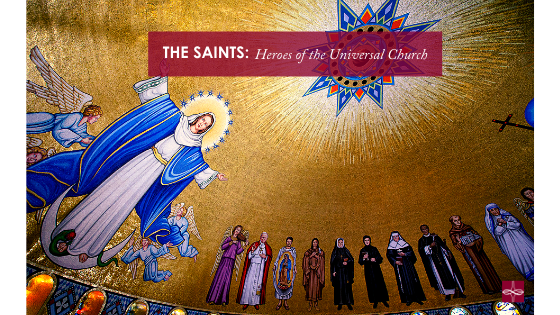



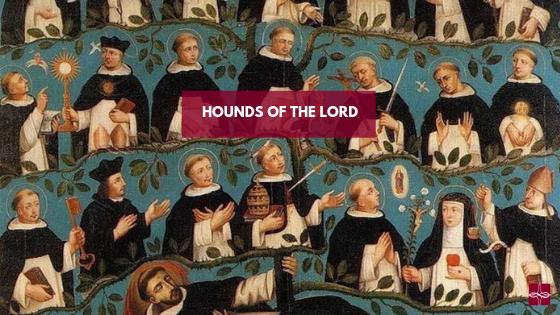

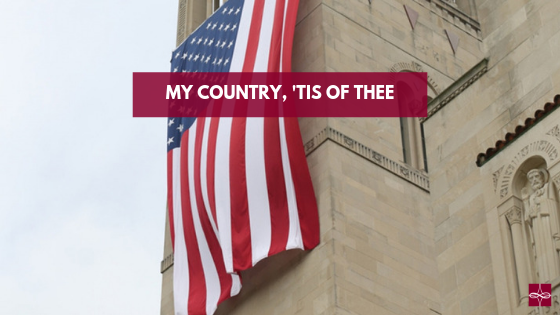

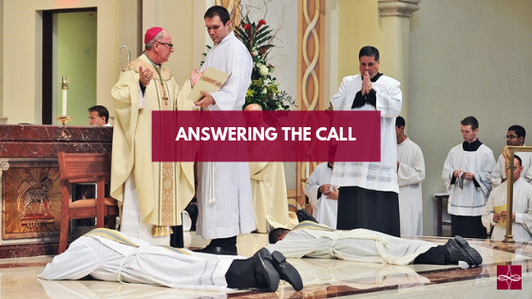

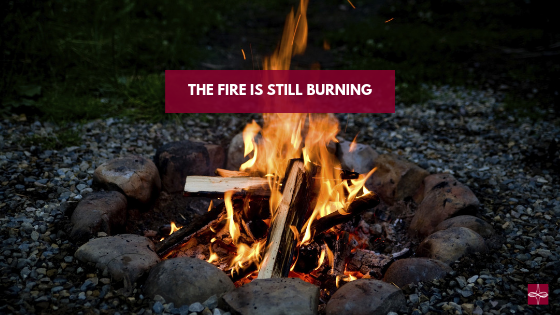

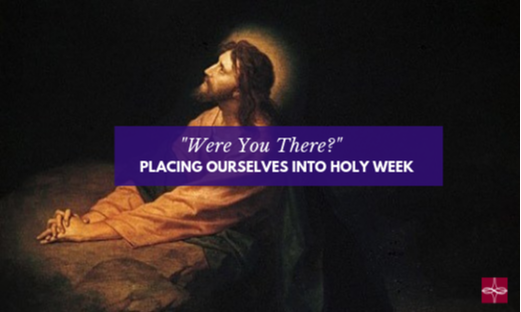

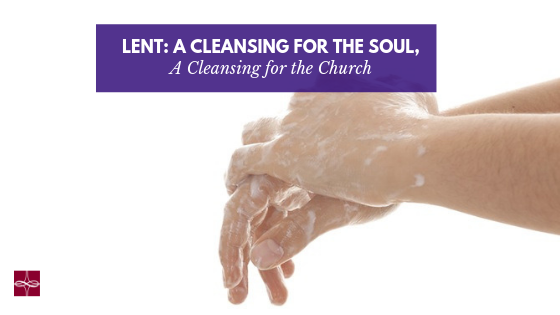

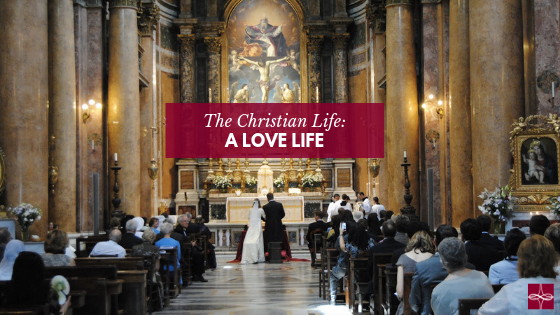

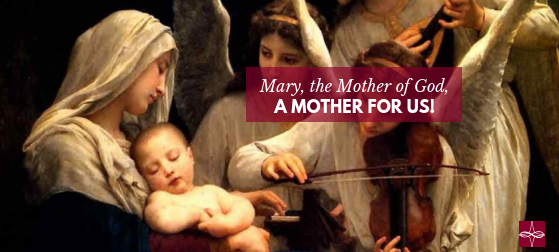

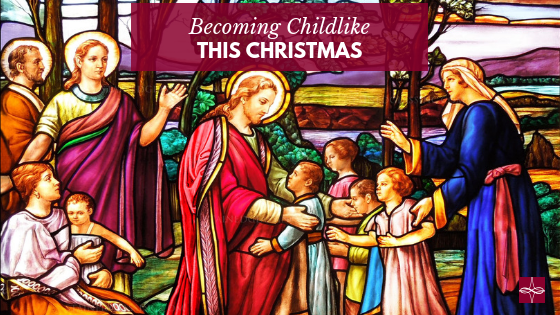

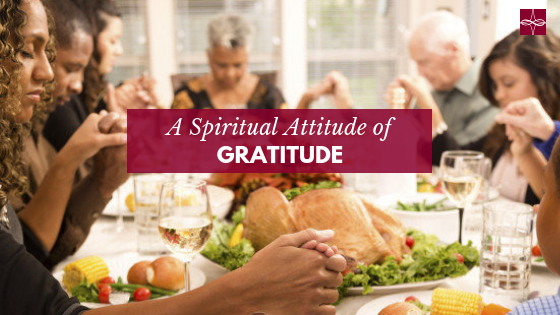

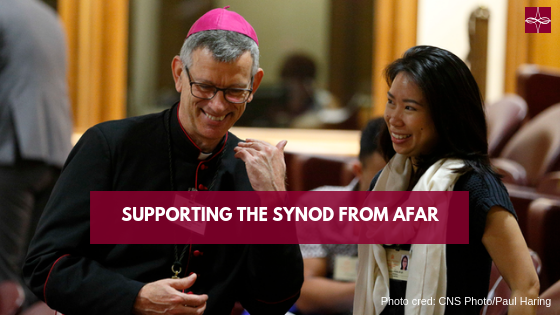



 RSS Feed
RSS Feed